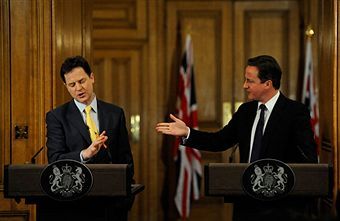 Nick Clegg’s speech in Luton today on extremism is a challenge to large parts of
David Cameron’s remarks on the subject in Munich just last month. Indeed, even the
venue of the speech can be seen as a rebuke to Cameron who was attacked for giving a speech on Islamic extremism on the same day that the English Defence League was marching in Luton.
Nick Clegg’s speech in Luton today on extremism is a challenge to large parts of
David Cameron’s remarks on the subject in Munich just last month. Indeed, even the
venue of the speech can be seen as a rebuke to Cameron who was attacked for giving a speech on Islamic extremism on the same day that the English Defence League was marching in Luton.
Cameron’s speech, which was one of the best of his premiership, argued that ‘the ideology of extremism is the problem’ and that terrorism’s ‘root lies in the existence of this extremist ideology’. In the key section of the speech, Cameron declared:
“As evidence emerges about the backgrounds of those convicted of terrorist offences, it is clear that many of them were initially influenced by what some have called ‘non-violent extremists’, and they then took those radical beliefs to the next level by embracing violence. And I say this is an indictment of our approach to these issues in the past. And if we are to defeat this threat, I believe it is time to turn the page on the failed policies of the past. So first, instead of ignoring this extremist ideology, we – as governments and as societies – have got to confront it, in all its forms.”
Clegg, by contrast, declares that the government must distinguish “between violent and non-violent extremism”.
This is not the only difference. Cameron also stressed that:
“Governments must also be shrewder in dealing with those that, while not violent, are in some cases part of the problem. We need to think much harder about who it’s in the public interest to work with. Some organisations that seek to present themselves as a gateway to the Muslim community are showered with public money despite doing little to combat extremism. As others have observed, this is like turning to a right-wing fascist party to fight a violent white supremacist movement. So we should properly judge these organisations: do they believe in universal human rights – including for women and people of other faiths? Do they believe in equality of all before the law? Do they believe in democracy and the right of people to elect their own government? Do they encourage integration or separation? These are the sorts of questions we need to ask. Fail these tests and the presumption should be not to engage with organisations – so, no public money, no sharing of platforms with ministers at home.”
Clegg counters with the far narrower line that, “We should ensure that public funds do not support any organisations promoting violence.”
In Tory circles, there are whisper — perhaps, unfair — that Clegg has deliberately chosen to pick a row with his coalition partners to obscure the result of today’s Barnsley by-election which many expect to be bad for the Liberal Democrats. But what Clegg’s speech means for government policy remains to be seen. One has to assume that the Prime Minister’s word will carry the day on a subject on which, in recent months, he has become determined to lead.







Comments